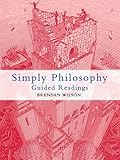Simply Philosophy : Guided Readings / Brendan Wilson.
Material type: TextPublisher: Edinburgh : Edinburgh University Press, [2022]Copyright date: ©2003Description: 1 online resource (224 p.)Content type:
TextPublisher: Edinburgh : Edinburgh University Press, [2022]Copyright date: ©2003Description: 1 online resource (224 p.)Content type: - 9780748618231
- 9781474473613
- 100
- B74.W55 2003
- online - DeGruyter
| Item type | Current library | Call number | URL | Status | Notes | Barcode | |
|---|---|---|---|---|---|---|---|
 eBook
eBook
|
Biblioteca "Angelicum" Pont. Univ. S.Tommaso d'Aquino Nuvola online | online - DeGruyter (Browse shelf(Opens below)) | Online access | Not for loan (Accesso limitato) | Accesso per gli utenti autorizzati / Access for authorized users | (dgr)9781474473613 |
Frontmatter -- Contents -- Introduction -- Area 1: Science -- 1. Aristotle . . . on scientific knowledge -- 2. Francis Bacon . . . on scientific method -- 3. David Hume . . . on the concept of a cause -- 4. Karl Popper . . . on induction -- 5. Hilary Putnam . . . against Popper -- 6. Paul Feyerabend. . . on scientific method -- Overview of Area 1 -- Area 2: Mind -- 7. B. F. Skinner . . . on behaviourism -- 8. C. S. Peirce . . . on reality and truth -- 9. Bertrand Russell. . . on sense-data -- 10. Rudolf Carnap. . . on the argument from analogy -- 11. A. J. Ayer . . . on other minds -- 12. Norman Malcolm . . . on other minds -- 13. Colin McGinn . . . on the mind/body problem -- 14. William James . . . on the reality of the mind -- 15. Paul Churchland . . . on the unreality of thoughts -- Overview of Area 2 -- Area 3: Freedom -- 16. Peter Strawson . . . on determinism -- 17. Norman Malcolm . . . on determinism -- 18. Daniel Dennett. . . on determinism -- 19. Max Black. . . on causality -- 20. Frederick Dretske . . . on the reality of meaning -- 21. Thomas Hobbes . . . on human nature -- 22. Immanuel Kant. . . on duty -- 23. Jeremy Bentham . . . on utilitarianism -- 24. Thomas Nagel. . . against utilitarianism -- 25. G. E. M. Anscombe . . . on ‘ought’ and ‘should’ -- Overview of Area 3 -- Area 4: Knowledge -- 26. Galileo Galilei. . . on perception -- 27. Rene Descartes . . . on doubt -- 28. John Locke . . . on knowledge -- 29. Hilary Putnam/Noam Chomsky. . . on innate ideas -- 30. George Berkeley. . . on Idealism -- 31. Thomas Reid . . . against scepticism -- 32. Immanuel Kant. . . on causality -- 33. David Hume . . . on miracles -- 34. Bertrand Russell. . . on knowledge -- 35. L. Jonathan Cohen . . . on empiricism -- Overview of Area 4 -- Area 5: Language -- 36. John Locke . . . on language -- 37. Gilbert Ryle . . . on Mill’s theory of names -- 38. Ludwig Wittgenstein . . . on proper names -- 39. Saul Kripke . . . on naming -- 40. Hilary Putnam . . . on language -- 41. W. V. Quine . . . on language -- 42. Plato . . . on universals -- 43. John Searle . . . on computer ‘understanding’ -- Overview of Area 5 -- Area 6: Objectivity -- 44. Roderick Chisholm . . . on perception -- 45. A. J. Ayer. . . on perception -- 46. Gilbert Ryle . . . on perception -- 47. Thomas Reid . . . on ideas -- 48. J. B. Watson . . . on behaviourism -- 49. Thomas Nagel. . . on qualia -- 50. J. J. C. Sm art. . . on mind/brain identity -- 51. Hilary Putnam . . . on functionalism -- 52. F. H. Bradley. . . on truth -- 53. Michael Dummett. . . on anti-realism -- Overview of Area 6 -- Area 7: God -- 54. Norman Malcolm . . . on the ontological argument -- 55. Thomas Aquinas . . . on the existence of God -- 56. Anthony Kenny. . . on teleology and design -- 57. Anthony Flew. . . on religious belief -- 58. Ludwig Wittgenstein . . . on religious belief -- 59. Soren Kierkegaard . . . on the ‘absurdity’ of belief -- 60. W. H. Newton-Smith . . . on metaphysics in cosmology -- Overview of Area 7 -- Further Reading -- Glossary -- Copyright Acknowledgements -- Index
restricted access online access with authorization star
http://purl.org/coar/access_right/c_16ec
Here is an anthology with a difference. Covering all the central areas of philosophy in sixty varied readings, it nevertheless provides a compact and accessible source book.Guided Readings presents the key ideas and arguments in the writings of philosophers from Plato and Aristotle, through Descartes, Locke, Hume and Kant, to modern figures like Russell and Wittgenstein, and contemporaries like Putnam and Searle. Incisive editing pares the source material down to the essentials, while commentaries and questions guide the reader towards a deeper understanding of the fundamental problems.This volume can be used with its companion, Simply Philosophy, to provide a complete introduction to the central themes and issues of Western philosophy. But it can also be used on its own, as a reader-friendly, text-based way into the heartland of the subject.Key FeaturesSixty short extracts, carefully chosen to cover all the central issues Clear and helpful comments and questions focus on the main ideasApproachable and up-to-date
Mode of access: Internet via World Wide Web.
In English.
Description based on online resource; title from PDF title page (publisher's Web site, viewed 29. Jun 2022)


